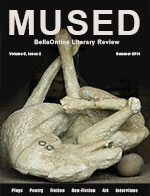Too Soon Old; Too Late Smart?
Elaine Frankonis
Under his white cassock, the good-looking young priest is wearing sneakers and jeans. I can see them peeking out from underneath the garment’s neat hem. The inside of the 110-year-old ornate church of my childhood is colder than this winter morning in the urban outside. The seat of the wooden pew is freezing my butt.
The church’s boiler has stopped working, and all through the service periodic clangings continue to irreverently punctuate the “words of the Lord.”
I am sitting in the exact spot in which I sat almost exactly a month ago. That was for my mother’s funeral service. This time it’s for my aunt’s (the wife of my father’s brother). They say that death comes in threes. I wonder if my 87-year-old aunt sitting to my left will be the third. I hope, instead, what will count is my dead desktop computer, which, at the moment is awaiting a possible resurrection on the repair desk of my most trusted geek. These are things over which I have no control.
I only go back to my home town for weddings and funerals, all of which include rituals celebrated in this spectacularly vaulted nave that is bordered by detailed mosaic depictions of the Stations of the Cross, above which large elaborate stained glass windows tell the rest of the story. The aesthetics of the church inspires awe, even without the faith that is supposed to sustain it.
Neither my cousin nor I join in the line to receive Holy Communion. It has been decades since either one of us believed and practiced what we had been so carefully taught during our 13 years of Catholic schooling. When we sit around the table hours after her mother’s burial, my cousin and I and dredge up shared memories of some of our more innocent times — the May processions in which we tossed rose petals as we walked down the aisle (“one, two, three, this is for you, Baby Jesus…”) My mind slips away to the less innocent scenes from the movie “The Polish Wedding.”
We spend hours sitting around that table — my cousin and I and our remaining paternal aunt and uncle — sharing family stories and attitudes that had somehow eluded me during the 17 years I lived in the bosom of a clan that had, apparently, quickly separated into two camps — the “laws” and the “in-laws,” although which was which depended on whose perspective one adopted.
The story that surprises me most is one associated with the version my mother told of a seminal event in my life about which I once wrote a poem. In my mother’s version, her mother saved my young life. In the “in-law” version, my other grandmother believed that my mother was withholding medical treatment for me in favor of “leeches.” I see now that it became a stand-off between two matriarchs, and family relationships through the generations suffered as a result.
While it was my mother’s side of the family that I came to know best, it was an aunt on my father’s side who most impressed me, even though I only knew her for a very short while in my pre-teens.
Eleanor married my Uncle John, to the chagrin of my paternal grandmother. Eleanor was a free spirit, odd and artsy and strikingly beautiful. She had her kitchen ceiling painted red, she started to teach me how to sketch faces, and she sewed me a lavish ruffled robe that I wore until I could no longer button it across my chest. Suddenly (or so it seemed to me) she and my uncle were gone — moved out of state, out of touch.
And, in our post-funeral table conversation with my relatives from that side of the family, I learn just how strict my paternal grandmother was, refusing to accept her non-conformist daughter-in-law and leaving the couple with little alternative but to create a life for themselves apart from family expectations. I begin to understand the difficulties that my mother had in fulfilling the expectations of her daughter-in-law role.
We have been a family burdened with expectations, and both my cousin and I acknowledge (with some private pride) that we opted not to meet a select number of them.
We are the matriarchs, now — much different in attitudes and expectations from our foremothers. At least we hope so.

